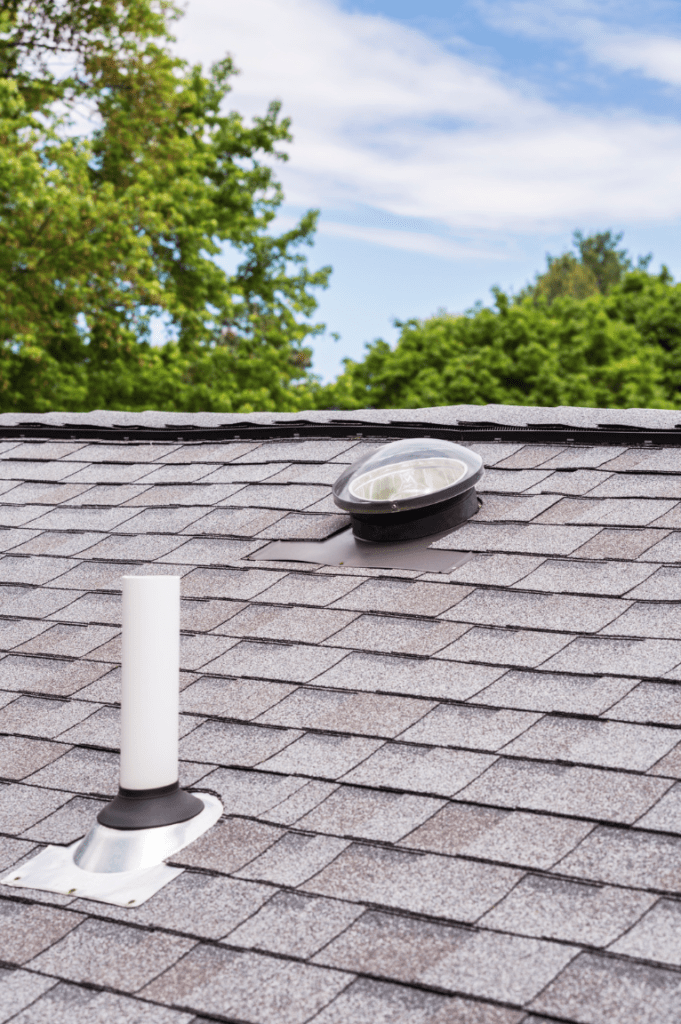You might not have heard about the septic tank vent. It’s not as famous as the tank or drain field, but it’s just as important.
This vent helps keep everything running smoothly. It lets the gases from the tank escape outside, keeps the pressure balanced, and stops a vacuum from forming. That could really mess things up!
We’ll get into the nitty-gritty of the septic tank vent in the next sections, so stick around!
Let’s Talk About the Septic Tank Vent
Ever wondered about that pipe sticking out of your roof? That’s your septic tank vent, and it’s a pretty big deal for your septic system. Let’s dive in!
So, what is a septic tank vent?
That pipe on your roof, also known as a vent or stink pipe, is your septic tank vent. It’s connected to your septic tank and shoots straight up above your roof.
It acts like a chimney for your septic system, letting gases escape up and away from your home.
Why do we need a septic tank vent?
The septic tank vent has some pretty important jobs:
Gas release
Your septic tank is like a factory for gases. As the waste breaks down, it produces gases like methane, carbon dioxide, and hydrogen sulfide.
Now, these gases can be harmful and even explosive in high concentrations. That’s where the vent comes in handy. It lets these gases escape safely into the open air.
Pressure regulation
The vent is like a pressure release valve. Without it, pressure in the tank can build up and mess with the waste flow.
It can even cause waste to back up into your house. Yuck!
Preventing vacuum formation
When a lot of water rushes into your septic tank, it can create a vacuum. The vent pipe lets air in, stopping the vacuum from forming and keeping the wastewater flowing smoothly.
How does the vent affect the septic system performance?
A well-working vent is key to a healthy septic system. Without good venting, gases can build up and throw off the pressure balance. This can lead to system inefficiencies and even health hazards.
By letting gases out and air in, the vent keeps your septic system working like a well-oiled machine, dealing with your home’s wastewater safely and effectively.
Up next, we’ll talk about what happens if a vent gets blocked or goes missing and how to spot a faulty vent.
What Happens When a Vent is Blocked or Missing?

Keeping your septic tank vent clear and working is super important. Why? Let’s see what can happen when things go wrong.
What’s the big deal about blocked vents?
Gas buildup
When a vent gets blocked, those waste gases we talked about have nowhere to go. This can lead to some pretty dangerous situations. For example, methane is flammable and could cause explosions if it builds up.
Sluggish system
A blocked vent can throw off the pressure balance in your septic system. This can slow down the waste flow or, worse, cause a messy backup into your house. No one wants that!
Health hazards
The gases from your septic tank aren’t just bad for the system; they can be harmful to us, too. Hydrogen sulfide can cause nausea and headaches, and too much methane can lead to suffocation.
How do I know if my vent is blocked?
Keep an eye (and ear) out for these signs:
Slow drains
If your sinks, showers, or toilets are draining slowly, your vent might be blocked.
Weird noises
If you hear gurgling or bubbling sounds from your drains, that could mean your vent is blocked.
Bad smells
If you’re noticing a foul smell in or around your house, your vent might be blocked. It’s the gases that can’t escape causing the stink.
What if I don’t have a vent?
Without a vent, your septic system can’t do its job properly. You’ll face issues like harmful gas buildup, pressure problems, and potential vacuum formation.
All these can damage your system or even cause it to fail. Plus, the health risks from exposure to septic gases aren’t something to take lightly.
So, make sure your septic system has a vent that’s clear and working well. In the next section, we’ll tell you how to maintain and check your septic tank vent.
Keeping Your Septic Tank Vents in Top Shape
Taking care of your septic system isn’t just about the routine pumping. You’ve also got to keep an eye on the venting system.
Why should I regularly check my septic system?
Regular check-ups of your septic system, vent included, are a must. Why? They help prevent big headaches like system failures and environmental pollution.
Plus, a well-kept septic system can handle your household waste for years, saving you money and protecting your family’s health.
How do I maintain and inspect a septic tank vent?
Spotting blockages
Make a habit of checking your septic tank vent for blockages. Leaves, bird nests, or snow could be the culprits.
Slow drains, strange noises, or bad smells can hint at a blocked vent.
Checking vent placement
Your vent should be high enough so gases safely move away from windows, doors, and outdoor areas. Also, your vent cap should keep out rain and debris but let gases escape.
Fixing vent pipes
If you spot blockages or damage, your vent pipe might need a clean or repair. This could mean removing blockages, replacing damaged pipe sections, or even getting a new vent.
Should I call a pro?
While you can handle some septic system tasks, it’s best to leave vent inspection and maintenance to the pros.
They have the right training and tools to safely work with septic gases and can spot issues that might slip past you.
If your vent is still acting up after your efforts, or if it’s been a year since your last septic system check, call a professional.
Regular professional inspections can spot small issues before they become big problems, saving you time and money.
In the next section, we’ll wrap up everything we’ve talked about regarding the importance and role of a vent in a septic tank system.
Conclusion
Getting your head around your septic system might seem like a big ask, but it’s all about understanding each part, like the septic tank vent.
The septic tank vent is a bit of a superhero. It gets rid of harmful gases from waste breakdown, keeps the pressure in the system just right, and stops a vacuum from forming when lots of water gets into the tank.
These jobs are super important for the system’s performance and for keeping your household and the environment safe.

